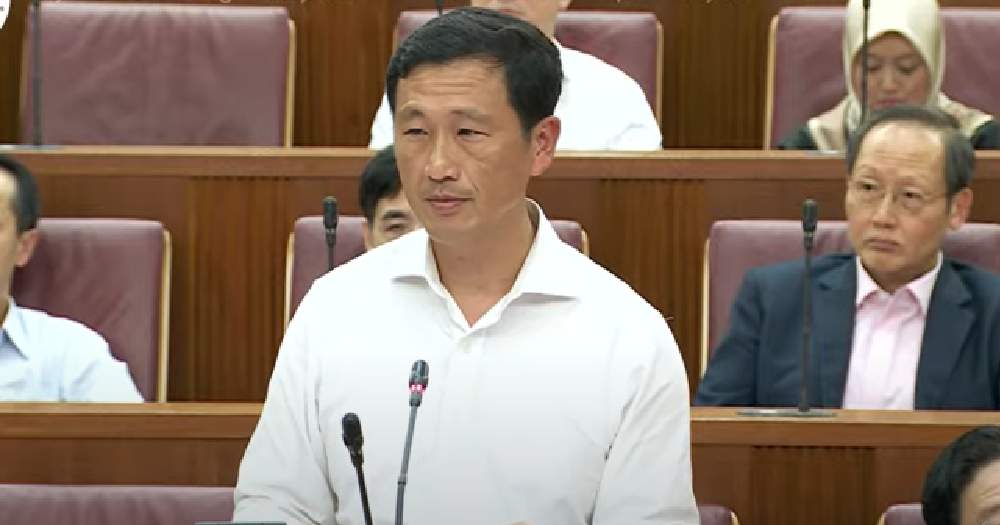Follow us on Telegram for the latest updates: https://t.me/mothershipsg
Health Minister Ong Ye Kung spoke in Parliament on the Healthier SG White Paper on Oct 5, addressing the needs of the growing aged population, as well as elaborating on the integrated nature of Singapore's health care.
The challenges associated with an ageing society can be better managed by maintaining healthy lives and practices.
Romance of the three healthcare systems
Ong said that Singapore's healthcare system was in fact three interconnected systems, "working together to deliver good health".
Acute care
First is the acute care system, which works on curing and treating the very sick. Ong said that this was what people thought of when they contemplated the healthcare system, comprising hospitals, specialist clinics, and emergency departments.
Singapore was expanding this system, with more acute care and community hospitals being built in upcoming years.
Public health system
Second is the public health system, or rather the systems put in place to maintain the health of the public.
This included the setting up and maintaining of the family doctor network, the practise of regular health screenings; as well as encouraging good lifestyle habits.
Another important part is the control of infectious diseases, as seen during the Covid-19 pandemic.
Aged care system
Third is the aged care system, built to care for the ever increasing number of older Singaporeans.
Although Singapore is in the process of nearly doubling the number of nursing home beds from 16,200 to 31,000 by 2030; Ong said that aged care was about more than just nursing home beds.
Ong said nursing homes could not be the mainstream solution to ageing, and warned against assuming that seniors should be isolated.
"If that mindset becomes entrenched, then over time, seniors become a problem to be contained and put aside in a nursing home, out-of-sight, out-of-mind. One day, that room will burst," Ong said.
He said that as many seniors as possible should be supported to live in the community, either independently or with help.
Working together
The three systems were interconnected, and Ong used the example of the Covid 19 pandemic to show the first two systems complementing each other.
"The public health system strengthened surveillance of the virus, got people to adopt good hygiene habits, receive vaccinations, stay home when unwell. The acute care system took care of those who got infected and experienced more severe symptoms."
In other countries, the three systems were sometimes run in silos, with public health care run at a national level, acute care handled at a local level.
Singapore's approach was an integrated one with all three systems under the Ministry of Health, where the Minister for Health was also the minister in charge of ageing issues and chair the multi-ministry task force for going beyond healthcare.
Ong said this allowed Singapore to have a "cogent and comprehensive plan" to deliver health outcomes for Singaporeans.
Challenges of an ageing society
Ong also spoke on the challenges of an aging society.
Singapore is one of the world's fastest aging societies, along with countries like Japan and South Korea. By 2030, the old would outnumber the young for the first time in world history.
By that time, one in four Singaporeans will be above the age of 65, as compared to one in six at the present time. Ong said that this was more than a statistic, with real impacts in workplaces, schools, and the built infrastructure of residential estates.
Families, previously geared towards the care of children, will have to take into account the care of two sets of elderly in-laws.
This had an impact on policy as well, with the healthcare system having to deal with a rising disease burden, increased healthcare facilities and personnel.
But Ong said that
"Our basic premise must be this - ageing may be an inexorable trend. But a rapid escalation of disease burden and suffering need not be a given. We can manage this provided we stay healthy."
Keeping healthy helps to deal with challenges of growing older
Ong said that none of the stereotypes about life stages, from when we graduate or develop chronic illnesses were set in stone, and that it was possible to delay frailty by keeping a healthy lifestyle.
Ong cited research saying that "estimated that the health impact of loneliness for a senior, is equivalent to smoking 15 cigarettes a day", as well as the statistic that 97 per cent of seniors above age 65 could currently live in the community, either independently or with some help.
The latter statistic was one that it was critical to maintain, while not inadvertently add to the former.
Ong gave examples such as stopping an elderly family member from cooking due to a single mishap, such as accidentally leaving a stove on, replacing the activity of cooking with either getting a helper for that purpose.
Another example is buying food for the family member on a daily basis. While well intentioned, it might expose them to the greater risk of isolation and loneliness.
This would eventually lead to the entrenched idea that seniors were a problem to be "contained and put aside." Instead, what seniors needed most was social support and connection, rather than more healthcare alone.
Sense of community important
Ong said Singapore's "greatest asset managing ageing" was inadvertently already in place, that was HDB estates.
"Most estates already have shared spaces for interaction and activities - coffeeshops, supermarkets, heartland shops, RC centres, community clubs," he said.
Singapore will tap into this by expanding the network of Eldercare centres, allowing spaces for seniors to gather, socialise, and even cook meals together.
Related story:
Top image via MCI/YouTube
If you like what you read, follow us on Facebook, Instagram, Twitter and Telegram to get the latest updates.
